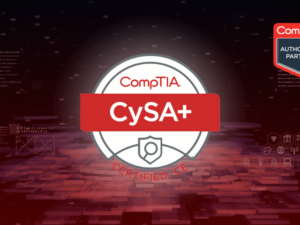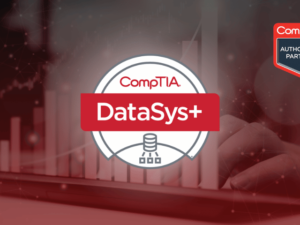CISSP Certified Information Systems Security Professional
- Description
- Reviews

CISSP CERTIFIED INFORMATION SYSTEMS SECURITY PROFESSIONAL
COURSE DESCRIPTION
The CISSP course will expand upon your knowledge by addressing the essential elements of the eight domains that comprise a Common Body of Knowledge (CBK) ® for information systems security professionals. The course offers a job-related approach to the security process, while providing a framework to prepare for CISSP certification. COURSE DURATION – 10 days VILT
COURSE OBJECTIVES
In this course, you will identify and reinforce the major security subjects from the eight domains of the (ISC) 2 CISSP CBK. You will:
- Analyze components of the Security and Risk Management domain.
- Analyze components of the Asset Security domain.
- Analyze components of the Security Architecture and Engineering domain.
- Analyze components of the Communications and Network Security domain.
- Analyze components of the Identity and Access Management domain.
- Analyze components of the Security Assessment and Testing domain.
- Analyze components of the Security Operations domain.
- Analyze components of the Software Development Security domain.
INTENDED AUDIENCE:
This course is intended for experienced IT security-related practitioners, auditors, consultants, investigators, or instructors, including network or security analysts and engineers, network administrators, information security specialists, and risk management professionals, who are pursuing CISSP training and certification to acquire the credibility and mobility to advance within their current computer security careers or to migrate to a related career. Through the study of all eight CISSP CBK domains, students will validate their knowledge by meeting the necessary preparation requirements to qualify to sit for the CISSP certification exam. Additional CISSP certification requirements include a minimum of five years of direct professional work experience in two or more fields related to the eight CBK security domains, or a college degree and four years of experience.
PREREQUISITES:
It is highly recommended that students have obtained CompTIA® Network+® or Security+® certifications, or possess equivalent professional experience upon entering CISSP training. It will be beneficial if students have one or more of the following security-related or technology-related certifications or equivalent industry experience:
- Certified Information Systems Auditor (CISA™)
- Certified Information Security Manager (CISM®)
- CyberSec First Responder (CFR)
- Systems Security Certified Practitioner (SSCP®)
- GIAC Security Essentials (GSEC)
- GIAC Information Security Fundamentals (GISF)
- Microsoft Certified Solutions Expert (MCSE)
- Cisco Certified Network Professional (CCNP)
- Red Hat Certified Engineer (RHCE)
- Linux Foundation Certified Engineer (LFCE)
COURSE OUTLINE
LESSON 1: SECURITY AND RISK MANAGEMENT
- Topic A: Security Governance Principles
- Topic B: Compliance
- Topic C: Professional Ethics
- Topic D: Security Documentation
- Topic E: Risk Management
- Topic F: Threat Modeling
- Topic G: Business Continuity Plan Fundamentals
- Topic H: Acquisition Strategy and Practice
- Topic I: Personnel Security Policies
- Topic J: Security Awareness and Training
- Topic A: Asset Classification
- Topic B: Privacy Protection
- TGopic C: Asset Retention
- Topic D: Data Security Controls
- Topic E: Secure Data Handling
LESSON 3: SECURITY ARCHITECTURE AND ENGINEERING
- Topic A: Security in the Engineering Lifecycle
- Topic B: System Component Security
- Topic C: Security Models
- Topic D: Controls and Countermeasures in Enterprise Security
- Topic E: Information System Security Capabilities
- Topic F: Design and Architecture Vulnerability Mitigation
- Topic G: Vulnerability Mitigation in Mobile, IoT, Embedded, and Web-Based Systems
- Topic H: Cryptography Concepts
- Topic I: Cryptography Techniques
- Topic J: Site and Facility Design for Physical Security
- Topic K: Physical Security Implementation in Sites and Facilities
LESSON 4: COMMUNICATION AND NETWORK SECURITY
- Topic A: Network Protocol Security
- Topic B: Network Components Security
- Topic C: Communication Channel Security
- Topic D: Network Attack Mitigation
LESSON 5: IDENTITY AND ACCESS MANAGEMENT
- Topic A: Physical and Logical Access Control
- Topic B: Identification, Authentication, and Authorization
- Topic C: Identity as a Service
- Topic D: Authorization Mechanisms
- Topic E: Access Control Attack Mitigation
- Topic A: Security Operations Concepts
- Topic B: Physical Security
- Topic C: Personnel Security
- Topic D: Logging and Monitoring
- Topic E: Preventative Measures
- Topic F: Resource Provisioning and Protection
- Topic G: Patch and Vulnerability Management
- Topic H: Change Management
- Topic I: Incident Response
- Topic J: Investigations
- Topic K: Disaster Recovery Planning
- Topic L: Disaster Recovery Strategies
- Topic M: Disaster Recovery Implementation
LESSON 8: SOFTWARE DEVELOPMENT SECURITY
- Topic A: Security Principles in the System Lifecycle
- Topic B: Security Principles in the Software Development Lifecycle
- Topic C: Database Security in Software Development
- Topic D: Security Controls in the Development Environment
- Topic E: Software Security Effectiveness Assessment
For FULL COURSE OUTLINE, please contact us. Please contact us for the schedules and for booking a private class
Request a Quote
Popular Courses
Archive
Working hours
| Monday | 9:00 am - 6.00 pm |
| Tuesday | 9:00 am - 6.00 pm |
| Wednesday | 9:00 am - 6.00 pm |
| Thursday | 9:00 am - 6.00 pm |
| Friday | 9:00 am - 6.00 pm |
| Saturday | Closed |
| Sunday | Closed |










